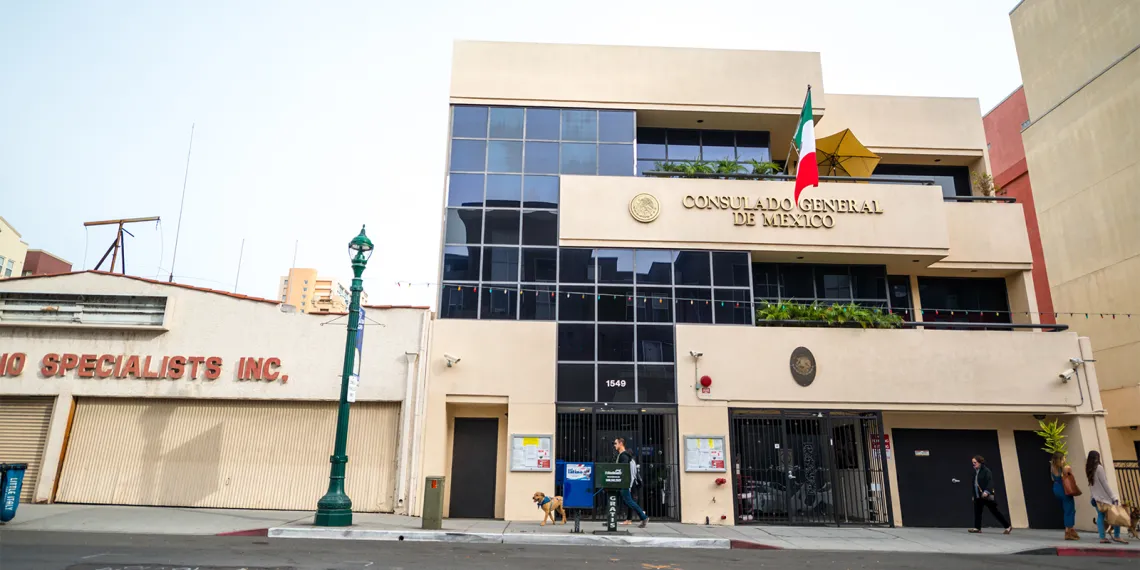In an effort to help Mexican nationals wade through various immigration and criminal issues, foreign service officers are studying the foundations of American law.
As border issues continue to vie for center stage in American politics, it’s more important than ever that Mexican diplomats have a firm understanding of the ever-changing American laws.
Though Mexican foreign service officers receive high levels of training in the fundamentals of United States law through their Mexico City-based diplomatic academy, Instituto Matias Romero, the Consul General, a longtime advocate of improving relations between the United States and Mexico, recognized the need for ongoing training to ensure diplomats were up to date on U.S. immigration and criminal law to better serve Mexican nationals on both sides of the border.
“Helping Mexican government officials provide services to those in the United States—or interested in coming to the United States—and having us be open to [sharing knowledge] that is useful for them in their work helps strengthen the relationship between our countries,” says Katherine Barnes, the associate dean of programs and innovation at the University of Arizona. “It’s a model of how different countries and organizations can work together, across cultures, toward a common goal.”
Creating a New Curriculum
An ongoing dialogue between Marc Miller, dean of the James E. Rogers College of Law at UArizona, and Ricardo Pineda, the Tucson-based Mexican Consul General, led to the launch of a new program for members of the Mexican diplomatic corps.
In 2017, administrators responded to a request for proposals, and the James E. Rogers College of Law was chosen from among a number of well-respected competitors to provide classes to the premier diplomatic corps. A team of seven faculty members, all experts in their fields, worked together to develop the curriculum, create course materials and teach classes; all of the resources were developed based on feedback from Mexican diplomats about their specific needs.
“We’re training diplomats, not lawyers; [the diplomat’s] role is not to provide legal advice but to help Mexican citizens to know where to go to identify their issues and, if needed, seek out legal services in the U.S. or Mexico,” says Miller. “[The courses] are less about discussions of case law that would happen in a traditional law school classroom and more about particular, factual settings and issues, and how those might be resolved or what sorts of resources might be available to help resolve them.”
With diplomats posted in 51 Mexican consulates and embassies across the United States, making it the largest foreign service operating in a host country, having everyone attend classes on the UArizona campus was not an option. To accommodate rigorous schedules and diverse locations of the diplomats, the classes were offered online.
Building Partnerships
The first session launched in fall 2018. More than 75 members of the Mexican diplomatic corps signed up for the first round of continuing education offerings, which included a six-week class in the fundamentals of U.S. law and four-week classes in immigration and criminal procedures. After their coursework and examinations were completed, diplomats received a certificate issued jointly from UArizona and the Mexican Foreign Ministry (Secretaría de Relaciones Exteriores).
Miller calls the level of engagement “stunning” and, based on positive feedback from the diplomats who participated in the initial cohort, law school faculty created a second round of classes on trade and economic law. All of these future classes will be offered on a rolling basis and, thanks to the ever-changing diplomatic corps, Miller expects the demand to remain high.
This partnership between UArizona and the Mexican Foreign Ministry has attracted a lot of attention, and the new cohort that started in May includes diplomats from Guatemala and El Salvador. And, consular generals from other countries have reached out to inquire about opportunities to work together to train their foreign service officers, too.
“We are in active conversations with other diplomatic corps’, and many of those countries have somewhat different priorities…with some focusing on employment and family law, indigenous rights, and cross-border trade and investment,” Miller says. “One of the things we hope we’ll establish is that we’ll become an ongoing and trusted partner and trainer for diplomats across different countries.”
In addition to providing essential training to help Mexican diplomats excel in their roles, Miller hopes that the relationship will accomplish a bigger goal—strengthening ties between the United States and Mexico. “A program that builds partnerships to increase our understanding and appreciation, whether it’s for legal systems, political systems or social systems, has got to be good,” she says, “both in the short and long run, for international relations.”


